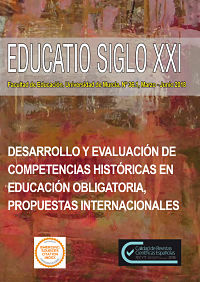Historical knowledge and competencies assessment at the Secondary Education exams. A comparative analysis between Spain and England
Abstract
This article analyzes how historical
knowledge is assessed in England and
Spain in the exams taken by students at
the end of Compulsory Secondary Edu-
cation. For this purpose, a sample of inci-
dental nature was collected with a total of
40 exams (20 for each country) and 400
questions. To analyze these documents,
a database was designed with different
categories: typology of questions; requi-
red cognitive level; concepts of historical
thinking assessed. The quantitative data
were exported to SPSS 19.0 with a view
to analyzing the frequencies, percentages
and the relationship between variables.
The results showed significant differen-
ces between the two countries. While in
Spain memory-based knowledge of facts,
data and concepts continues to dominate,
in England, the methodological aspects of
historical evidence, source analysis, and
historical argumentation are even more
important.
Downloads
-
Abstract1084
-
PDF (Español (España))1065
Original work publishes in this journal is subject to the following terms:
1. Murcia University Press (the publishing house) holds the copyright of the publishes work, and favours and allows their reutilization under the use license stated in point 2.
© Servicio de Publicaciones, Universidad de Murcia, 2015
2. Work is published in the electronic edition under a license (Creative Commons Reconocimiento-NoComercial-SinObraDerivada 4.0 España (legal text). They can be copied, used, disseminated, transmitted and publicly presented, as long as: i) authorship and original publication source is acknowledged (journal, publishing house and URL of the work); ii) are not used for commercial purposes; iii) the existence and specifications of this use license is stated.
3. Conditions for self-archive. Authors are allowed and encouraged to disseminate electronically the pre-pint (before review) and/or post-print (accepted for publication) versions of their work before their publication since that favours earlier circulation and dissemination resulting in an increased chance for the authors to be cited and for the work to reach a bigger share of the academic community. Colour: RoMEO: green.








